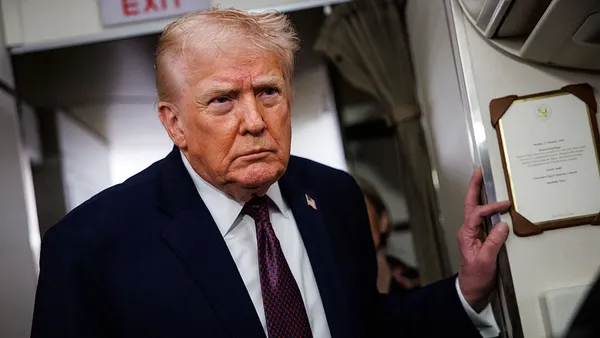Seven businesses and a dozen states urged the Supreme Court on Monday to strike down President Donald Trump's use of the International Emergency Economic Powers Act to impose broad tariffs, calling it illegal and an unprecedented tax burden on companies.
The Supreme Court agreed last month to an expedited hearing on the legality of Trump's tariffs, following an appellate court ruling that they were illegal. The court has scheduled oral arguments for Nov. 5.
In September, the court directed the parties in the now combined case to deliver written briefs prior to the hearing. Monday’s arguments to the high court were in two separate response briefs countering the government's Sept. 19 opening brief.
The two latest filings differed in emphasis and framing but held the same core message that tariffs are Congress' constitutional domain and not a tool that the president can use without restraint through an emergency declaration.
The plaintiffs challenged Trump's claims of statutory and constitutional authority under IEEPA to impose tariffs globally. Combined, the briefs argued that the act only allowed the president to block or freeze property in which a foreign entity has an interest while disputing the president's position on constitutional grounds.
"IEEPA does not give the President such vast unilateral power. Indeed, it does not give the President any taxing or tariffing power," said the brief filed by plaintiffs in the suit Learning Resources, Inc. et al v. Trump. The Supreme Court agreed last month to consolidate the suit with the set of plaintiffs in a separate case, V.O.S. Selections, Inc. et al v. Trump.
Both arguments attacked the government's reading of IEEPA as a distortion of verbs within the statute. The V.O.S. brief argued that “investigate,” “block,” “regulate” and other words within the statute only authorized embargoes, asset freezes and similar economic sanctions on enemy nations. Learning Resources plaintiffs made a similar point but connected it to the separation of constitutional powers between the president and Congress.
"None of the verbs surrounding “regulate” ... connotes taxing authority," the brief said. "Nor is there any evidence in the statutory history of IEEPA, or its predecessor Trading with the Enemy Act (“TWEA”), that Congress intended to grant the President unbounded power to impose tariffs."
The V.O.S. filing also challenged the Trump administration's claims that the nation's chronic trade deficits constituted an "unusual and extraordinary threat" worthy of imposing tariffs under IEEPA.
"That is a breathtaking assertion of power, and one would expect to see an unequivocal grant of authority from Congress to support it—if the Constitution permits it at all," the brief said. "Yet the statute the President invokes, the International Emergency Economic Powers Act (IEEPA), never mentions tariffs, and in 50 years no other President has used it for that purpose."
The Learning Resources brief claimed that the president's use of levies would bankrupt many small U.S. businesses and cost the average American at least $1,000 per year.
The brief said that Trump has “raised and lowered, paused and resumed, and threatened and unthreatened tariffs at will, for a grab bag of reasons. By the government’s own account, those actions amount to an over $3 trillion tax increase on Americans over the next decade.”
The V.O.S. filing said the IEEPA tariffs would hurt small businesses in particular because many rely heavily on goods only produced efficiently abroad.
"These ever-changing tariffs multiply their costs, disrupt their supply chains, harm their relationships with suppliers and customers, and make it impossible for them to plan," the brief said. "The legal obligation of these tariffs falls entirely on American businesses, not foreign producers or governments."
Despite the differences in tone and legal focus, both sides agreed on how the Supreme Court should rule.
"This Court should hold the IEEPA tariffs unlawful, and finally put an end to the unprecedented and unrelenting tax burden on Americans," the Learning Resources brief said.














